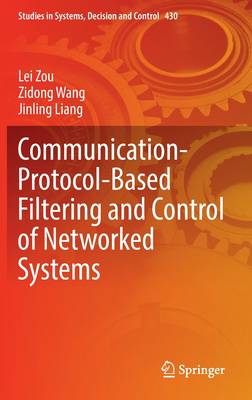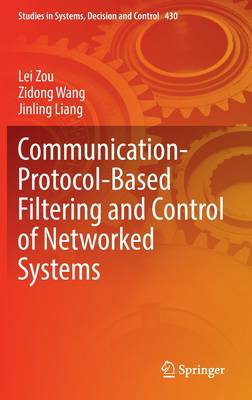
- Afhalen na 1 uur in een winkel met voorraad
- Gratis thuislevering in België vanaf € 30
- Ruim aanbod met 7 miljoen producten
- Afhalen na 1 uur in een winkel met voorraad
- Gratis thuislevering in België vanaf € 30
- Ruim aanbod met 7 miljoen producten
Communication-Protocol-Based Filtering and Control of Networked Systems
Lei Zou, Zidong Wang, Jinling LiangOmschrijving
Communication-Protocol-Based Filtering and Control of Networked Systems is a self-contained treatment of
- the state of the art in communication-protocol-based filtering and control;
- recent advances in networked systems; and
- the potential for application in sensor networks.
This book provides new concepts, new models and new methodologies with practical significance in control engineering and signal processing. The book first establishes signal-transmission models subject to different communication protocols and then develops new filter design techniques based on those models and preset requirements for filtering performance. The authors then extend this work to finite-horizon H-infinity control, ultimately bounded control and finite-horizon consensus control. The focus throughout is on three typical communications protocols: the round-robin, random-access and try-once-and-discard protocols, and the systems studied are drawn from a variety of classes, among them nonlinear systems, time-delayed and time-varying systems, multi-agent systems and complex networks.
Readers are shown the latest techniques--recursive linear matrix inequalities, backward recursive difference equations, stochastic analysis and mapping methods. The unified framework for communication-protocol-based filtering and control for different networked systems established in the book will be of interest to academic researchers and practicing engineers working with communications and other signal-processing systems. Senior undergraduate and graduate students looking to increase their knowledge of current methods in control and signal processing of networked systems will also find this book valuable.
Specificaties
Betrokkenen
- Auteur(s):
- Uitgeverij:
Inhoud
- Aantal bladzijden:
- 212
- Taal:
- Engels
- Reeks:
- Reeksnummer:
- nr. 430
Eigenschappen
- Productcode (EAN):
- 9783030975111
- Verschijningsdatum:
- 4/05/2022
- Uitvoering:
- Hardcover
- Formaat:
- Genaaid
- Afmetingen:
- 156 mm x 234 mm
- Gewicht:
- 498 g

Alleen bij Standaard Boekhandel
Beoordelingen
We publiceren alleen reviews die voldoen aan de voorwaarden voor reviews. Bekijk onze voorwaarden voor reviews.









